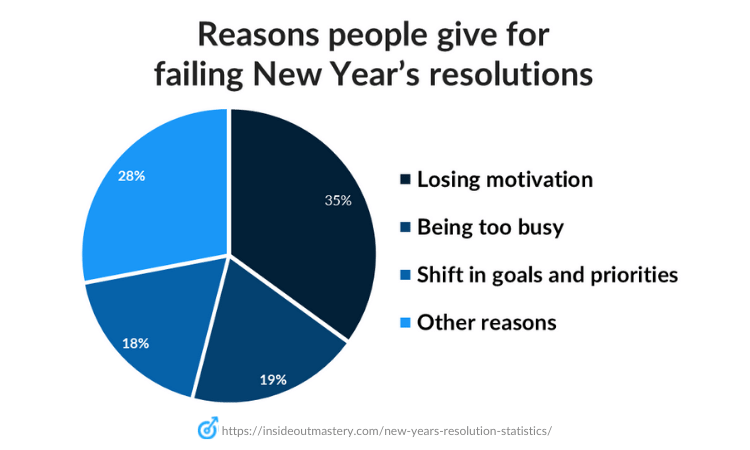Gallery
Photos from events, contest for the best costume, videos from master classes.




:max_bytes(150000):strip_icc()/__opt__aboutcom__coeus__resources__content_migration__mnn__images__2018__12__list_new_years_resolutions-9410f9598ca64e5c8e1aa9462484859b.jpg)


:max_bytes(150000):strip_icc()/keep-new-years-resolutions-copy-2000-37e0fc824e7c4542b835c4a646ca3925.jpg)




Many people make New Year's resolutions but few keep them. Learn the psychology behind why our resolutions fail and what we can do to meet our goals instead. Most New Year’s resolutions fail, especially for leaders. Discover why vague goals and no accountability don’t work—and learn smarter strategies for real, lasting change. Here are 7 reasons why so many New Year’s Resolutions fail and, more importantly, how to set yourself up for success: 1. Your Goals Aren’t Specific Enough. “I want to get healthier” is a great mission, but not a great goal. The universe responds to specificity, and so does your brain. Here are eight ways to stick with your New Year’s resolution well beyond January and all the way to completion. Think small. Build self-trust. Invent challenges. Cultivate optimism. Make Rather than abandoning the resolution entirely, scale it to something more achievable. For instance, if daily meditation for 30 minutes proves overwhelming, try 10 minutes instead. Related: 10 Surprising New Year’s Resolutions That Will Boost Your Happiness. Conclusion. Achieving your New Year’s resolutions doesn’t have to be an annual Motivation Why New Year’s Resolutions Set You Up to Fail Skip the resolutions this year and try news strategies instead. Updated December 29, 2024 | Reviewed by Gary Drevitch Uncover the psychological nuances behind the gap between good intentions and actual follow-through when it comes to New Year's Resolutions, exploring phenomena like hyperbolic discounting and identity attachment. 80% of New Year's Resolutions fail, and there are three key reasons for that. Here's how to make sure your biggest goals can be achieved in 2020 and beyond. First things first: If you’re feeling like you’ve failed, take a deep breath and forgive yourself — you’re only human. Next, figure out why New Year’s resolutions fail for you, and follow these steps to help you get closer to your New Year’s goals, realistically. “I’ve seen two different statistics, one is that 80% of resolutions fail by the second week in February,” Phillips says. “The other is a bit less depressing and that’s 40% of us are In fact, failing at New Year’s resolutions is so common that there’s even a slew of (unofficial) dates commemorating such failures—some sources cite “Ditch New Year’s Resolutions Day It's totally normal to feel regret over getting sidetracked from last year's goals, and it's OK to want a do-over for last year's failed New Year's resolution commitment. However, before you jump right into recommitting to your goals from the previous year, take a moment to meditate on why these goals did not come to fruition in the first place. Depending on where you get your numbers, somewhere between 81 percent and 92 percent of New Year’s Resolutions fail. 1. Translation: At least 8 times out of 10, you are more likely to fall back into your old habits and patterns than you are to stick with a new behavior. Motivation Why New Year's Resolutions Fail Four common ways you may be standing in the way of your personal growth. Posted December 5, 2018 | Reviewed by Jessica Schrader With research indicating that 80% of people ditch their New Year’s resolutions by February, it’s time to officially label this ritual as an exercise in futility. Instead of wasting time on 9% successfully keep their New Year’s resolutions. Research Methodology. I’ve analyzed every piece about New Year’s resolution statistics I could get my hands on. And I’ve compiled the most mind-blowing and credible findings into this article. Note that most New Year’s resolution statistics originate from research in the US. New Year's resolutions often fail because they are motivated by other people's expectations. Asking yourself whether your resolution is truly yours makes all the difference. 80% of people fail to keep up their New Year's resolutions by February. There is a way to keep them When you create a New Year’s Resolution this year consider joining a group. Nearly 40% of Americans make New Year’s resolutions every year. Unfortunately, around 90% of these earnest ambitions will end in failure by the second week of February. Ultimately, only 9% will achieve their goals. Clearly, this stuff is harder than it looks. But the good news is that there are well-defined reasons why we fail. As a therapist, I began questioning the utility of New Year’s resolutions. They seemed to foster a pass-or-fail mindset that left little room for growth, nuance, or the realities of life.
Articles and news, personal stories, interviews with experts.
Photos from events, contest for the best costume, videos from master classes.




:max_bytes(150000):strip_icc()/__opt__aboutcom__coeus__resources__content_migration__mnn__images__2018__12__list_new_years_resolutions-9410f9598ca64e5c8e1aa9462484859b.jpg)


:max_bytes(150000):strip_icc()/keep-new-years-resolutions-copy-2000-37e0fc824e7c4542b835c4a646ca3925.jpg)



